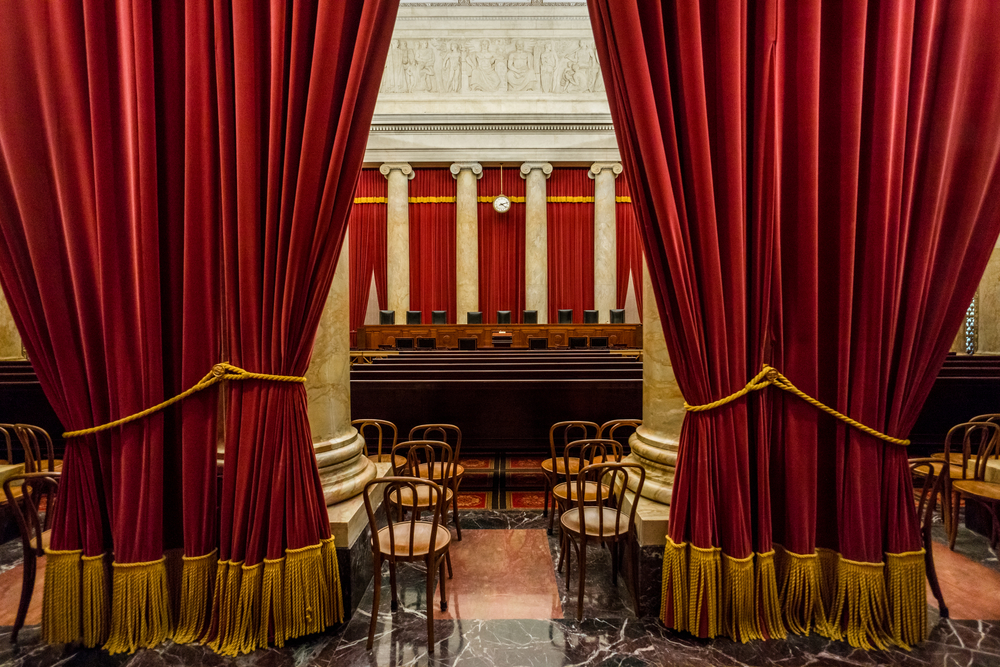How term limits for Supreme Court justices—now backed by Biden—could work

U.S. Supreme Court justices should be subject to term limits and a binding ethics code, President Joe Biden has said in an op-ed for the Washington Post. (Image from Shutterstock)
U.S. Supreme Court justices should be subject to term limits and a binding ethics code, President Joe Biden has said in an op-ed for the Washington Post.
Biden is also calling for a constitutional amendment to overturn the Supreme Court’s July 1 decision in Trump v. United States, which held that presidents are entitled to “absolute immunity” for exercising core constitutional powers and presumptive immunity for acts “within the outer perimeter” of their official responsibilities.
“I am calling for three bold reforms to restore trust and accountability to the court and our democracy,” Biden said in the July 29 op-ed.
Term limits “would make timing for court nominations more predictable and less arbitrary,” Biden wrote. He supports a system in which a president would appoint a justice every two years to spend 18 years in active Supreme Court service.
Proposals for 18-year term limits were outlined by a 36-member presidential commission appointed by Biden in April 2021. The Presidential Commission on the Supreme Court of the United States, made up largely of law professors, took no position on term limits in its final report released in December 2021, however.
Members of the commission were divided on whether term limits could be accomplished by statute or whether a constitutional amendment is needed. All federal judges “hold their office during good behavior” under Article III of the U.S. Constitution, which means that they have lifetime appointments.
Under one statutory proposal, after 18 years of service, a Supreme Court justice would become a senior justice who no longer participates in the regular work of the Supreme Court. They could sit by designation in the lower courts and could assist the chief justice in administrative duties.
Under another proposal, presidents would appoint judges from the lower federal courts to an 18-year Supreme Court term. After that, they would return to their lower court.
To begin the process, the longest-serving justice could retire and become a senior justice in the first year after the statute is implemented. Another proposal would begin the 18-year term process only when a current sitting justice retires.
To avoid impasses in confirmation of nominees, the statute could lower the threshold for confirmation each time that the U.S. Senate rejects a nominee, the commission’s report said.
Biden said term limits “would reduce the chance that any single presidency radically alters the makeup of the court for generations to come.”
“On top of dangerous and extreme decisions that overturn settled legal precedents—including Roe v. Wade—the court is mired in a crisis of ethics,” Biden said. He cited undisclosed gifts to justices and “conflicts of interest connected with Jan. 6 insurrectionists.”
Justice Clarence Thomas’ wife, Virginia “Ginni” Thomas, had backed efforts to overturn the 2020 election. He also did not disclose luxury trips from benefactors.
The Supreme court’s current ethics code “is weak and self-enforced,” Biden said. A binding code of conduct for the justices “is common sense,” he wrote.
Biden dubbed his proposed constitutional amendment the “No One Is Above the Law Amendment.” The Supreme Court’s decision on presidential immunity, he said, “means there are virtually no limits on what a president can do.”
Will Biden’s proposals come to fruition? Not likely, according to the National Law Journal.
“Republicans, who control the House of Representatives and can block legislation in the Senate via filibuster, have been uniformly hostile to talk of overhauling the Supreme Court,” the article reports.
And amending the Constitution is even more difficult.
Write a letter to the editor, share a story tip or update, or report an error.


